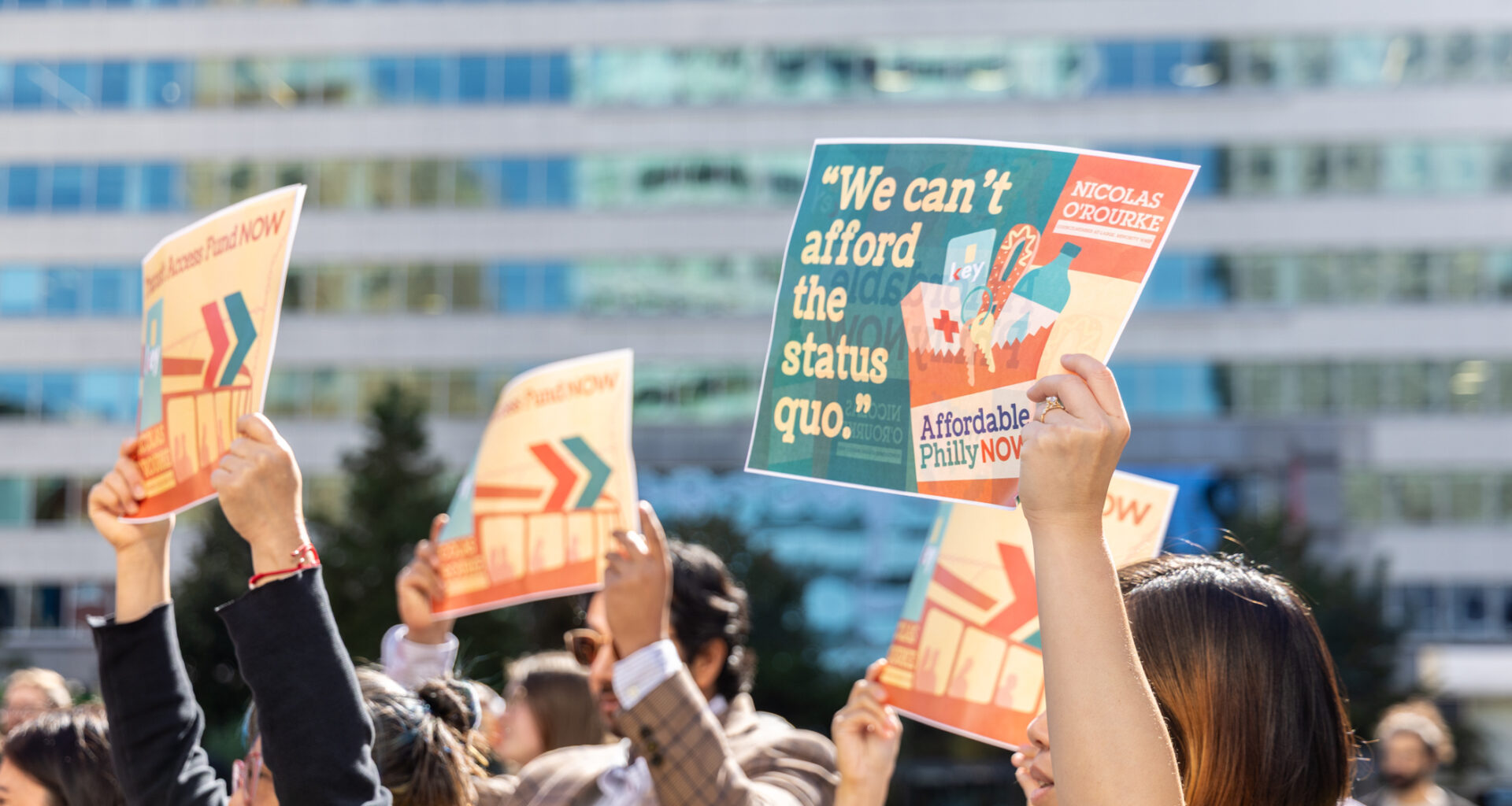SEPTA’s former boss, progressive preachers, a free groceries provider, legal aid lawyers, step dancers and a gospel choir made noise in LOVE Park Thursday to promote Councilmember Nicolas O’Rourke’s new package of living affordability bills.
The measures O’Rourke introduced in council before the rally would create a new rent rebate for low-income tenants, make the city’s zero-fare SEPTA program permanent, and ban any future attempt to privatize Philadelphia’s Water Department. He also proposed a cost-of-living task force to recommend other affordability initiatives.
The councilmember, one of two from the Working Families Party, described the legislative package as part of a broader effort to push back against President Donald Trump’s villainization of government programs, and make government work better for struggling city residents.
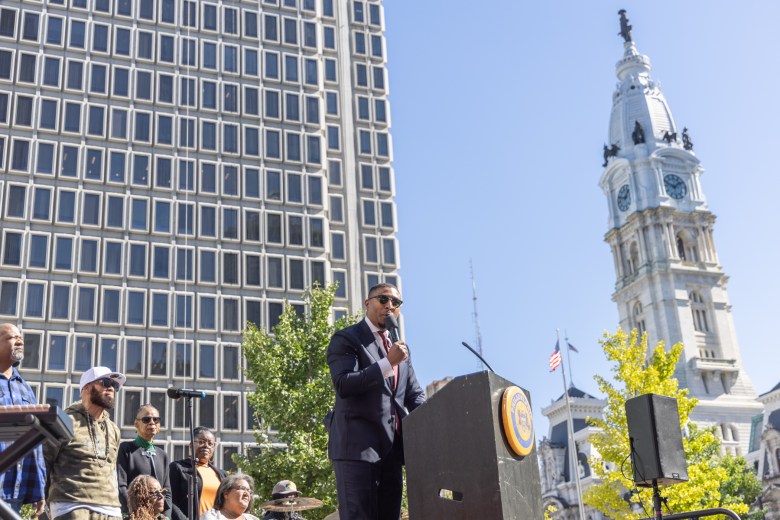 City Councilmember At-Large Nicolas O’Rourke held a press conference at LOVE Park to announce the Affordable Philly agenda on October 9, 2025. (Kimberly Paynter/WHYY)
City Councilmember At-Large Nicolas O’Rourke held a press conference at LOVE Park to announce the Affordable Philly agenda on October 9, 2025. (Kimberly Paynter/WHYY)
“This Affordable Philly Now initiative, I believe, is a way to not only fight Trump, but how Trump-ism works. That man’s argument to America has been from day one, ‘you can’t trust the government, drain the swamp, they are why you’re struggling, but I’m your guy,’” O’Rourke said, speaking from a stage set up in the park.
While local government is made up of fallible people and often fails to respond to residents’ concerns, officials can work to restore faith in public service and show their constituents they have a say in how it works, he argued.
“We’ll collaborate to produce policies that make a real difference, but we’re also going to uplift what’s happening right now, to ease the cost of living right now,” he said. “The core work is still our local fight against poverty.”
Pushing to amend the city Charter
The new rebate program would aim to give up to about $500 per year to renters who are seniors, widows or have disabilities and are on fixed incomes, O’Rourke said.
The payments would roughly match amounts that eligible renters already receive from the state’s Property Tax/Rent Rebate program, which vary between $380 and $1,000 depending on their income. People in the state program would automatically be approved for the new initiative, which would cost the city $10 million to $20 million a year, depending on the number of participants, O’Rourke said.
Supporters of the proposal and the overall affordability plan include Brendan Corbalis, an attorney at the SeniorLAW Center, a free legal aid provider.
“Philadelphia has one of the largest and poorest populations of older adults in the nation. Senior poverty, hunger, homelessness and abuse continues to rise nationally and here in Philadelphia as well,” he told about 50 people gathered in LOVE Park for the rally. “This is the birthplace of the Constitution. We have to do better.”
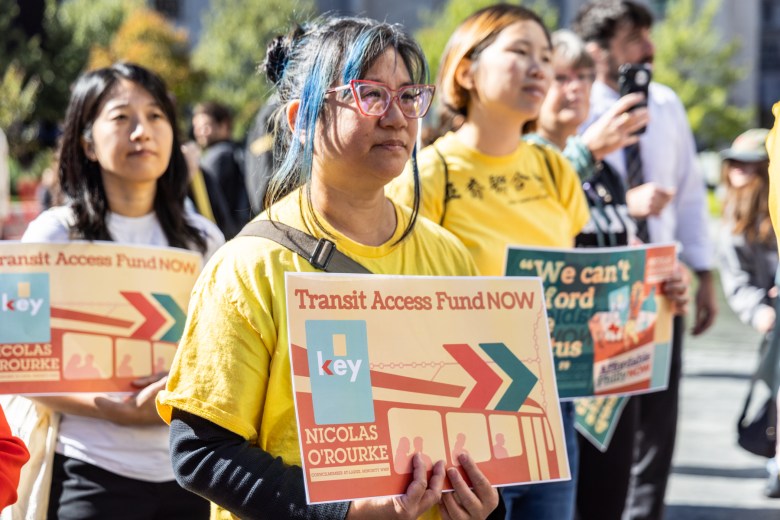 Supporters of the Affordable Philly agenda cheered for speakers at the press conference at LOVE Park on October 9, 2025. (Kimberly Paynter/WHYY)
Supporters of the Affordable Philly agenda cheered for speakers at the press conference at LOVE Park on October 9, 2025. (Kimberly Paynter/WHYY)
O’Rourke’s transit access fund proposal seeks to make the city’s Zero Fare program for low-income SEPTA riders permanent by putting its funding line in the city charter. The city would be required to contribute an amount equal to half a percent of the general fund, or about $30 million per year.
In 2023, former mayor Jim Kenney’s administration used federal pandemic aid dollars and other funds to launch the program, which provides free SEPTA passes to 25,000 randomly selected low-income residents. Mayor Cherelle Parker proposed defunding the program last year, but after protests from O’Rourke and others the dollars were restored in the city budget.
Former SEPTA general manager and PennDOT secretary Leslie Richards told rally attendees that if O’Rourke’s bill is approved and a majority of voters support a ballot measure amending the Charter, the fund would provide free transit to more than 60,000 residents.
“Philadelphia residents with lower incomes face some of the highest transit cost burdens in the United States,” said Richards, who is now a UPenn professor. “SEPTA is becoming increasingly hard to afford for these riders. Without a long-term plan for funding the Zero Fare program, these residents are at risk of losing crucial access to their city and their community.”
Earlier this year voters approved a somewhat similar charter amendment mandating that certain developer fees going toward creating affordable housing. It passed over objections from the administration, which argued it would “bind the hands” of future mayors during budget negotiations.
Banning privatization, just in case
A third bill would ask voters to approve another charter amendment, this one to ban the city from privatizing or otherwise contracting out the ownership or operation of its water supply and sewage systems.
O’Rourke acknowledged there’s no indication the city plans to sell its pump stations, treatment plants, water pipes, sewers and other infrastructure.
But he pointed out that a number of cities across Pennsylvania and other states have privatized in recent years, and Pittsburgh voters earlier this year to ban the sale of their city’s system. Residents had complained about its operations under an independent authority, which had a contractual option to acquire the utility.
“If it can happen as close as the other big city in Pennsylvania, certainly Philadelphia is not off the chopping block. I don’t want to wait until it becomes explicitly clear that some corporation is ready to put a bid in to buy public water,” the councilmember said.
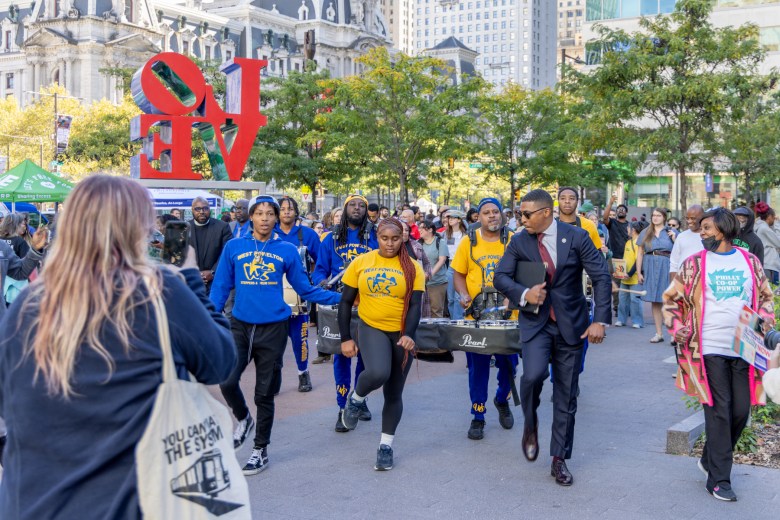 City Councilmember At-Large Nicolas O’Rourke kicked off a press conference dancing at LOVE Park to announce the Affordable Philly agenda with the West Powelton Step and Drum Squad on October 9, 2025. (Kimberly Paynter/WHYY)
City Councilmember At-Large Nicolas O’Rourke kicked off a press conference dancing at LOVE Park to announce the Affordable Philly agenda with the West Powelton Step and Drum Squad on October 9, 2025. (Kimberly Paynter/WHYY)
The state-appointed receiver overseeing Chester’s bankruptcy process has proposed having a private operator run the Chester Water Authority, while keeping it publicly owned. Retired city employees have sued, arguing the city should be allowed to sell the agency.
Privatization proponents argue that selling municipal systems to big private companies like American Water provides a one-time windfall for cash-strapped cities and provides for technology upgrades and more efficient management, while critics say sales typically result in rate increases for customers.
“We want to make sure that we preempt what we’re already seeing as a trend, so that we can make sure that rates for working people in city of Philadelphia — which up until about a month ago was the poorest big city in the country — we don’t want that to go up,” O’Rourke said.
Looking for progressive allies
One theme running through the rally speeches was that other councilmembers and city officials don’t fully agree with O’Rourke’s progressive agenda of creating new or expanded city-funded benefits and programs for low-income residents.
After remarks by Councilmember Kendra Brooks, his fellow Working Families Party member, he made a reference to nearby City Hall, saying “everybody in that building doesn’t necessarily think like Kendra Brooks. Let’s be honest about it.”
In another speech, Rev. Dr. Gregory Edwards, executive director of POWER Interfaith and a mentor to O’Rourke, scolded the City Council majority for voting in June to approve Parker’s plan to “give away millions in tax breaks to big businesses,” as he put it.
The latest city budget begins a process of trimming two levies that make up the Business Income and Receipts Tax over the next decade and a half, in an effort to encourage business formation and hiring. It was fiercely opposed by council’s progressive wing and some activist groups, who say the reduced revenue could lead to cuts in city services.
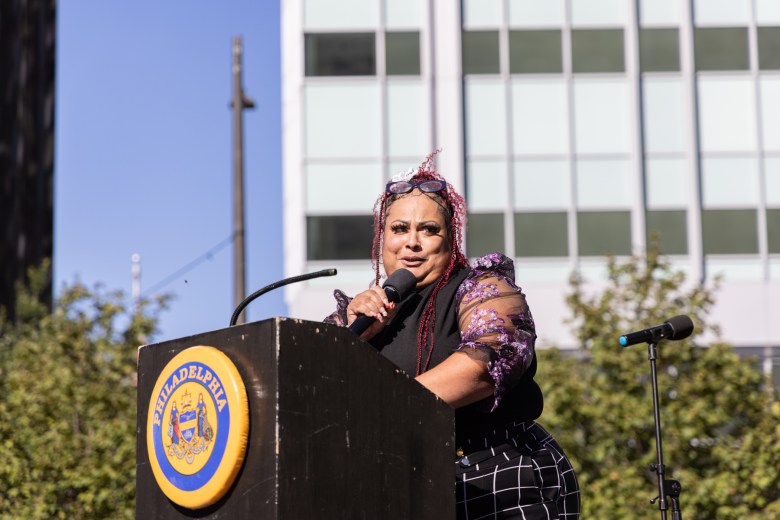 Gloria “Smooches” Cartagena Hart, a Zero Fare recipient, talked about her experience with the transit program at the Affordable Philly press conference at LOVE Park on October 9, 2025. (Kimberly Paynter/WHYY)
Gloria “Smooches” Cartagena Hart, a Zero Fare recipient, talked about her experience with the transit program at the Affordable Philly press conference at LOVE Park on October 9, 2025. (Kimberly Paynter/WHYY)
“They put pen to paper that created more poverty and more pain in a city already immersed with economic challenges, in a moment where the affordability crisis is growing. We need all the money we can get for our people and not for big business,” Edwards said. “But these policy decisions are made by people, and that means people who made the policy decisions can also change them.”
But O’Rourke noted in an interview that the city has supported some new or expanded assistance programs in recent years, such as the Basic Systems Repair Program, the Homestead Exemption for homeowner taxes, and the PHLHousing+ guaranteed income pilot, which receives some city funding.
Council has “presented programs that intervened in the market to be able to make sure that our constituents, those who are most in need, have resources, have the things that they need,” he said. “I want to work with those folks on issues like that to see where there’s alignment so that we can go ahead and press on this issue.”
He said he expects it will take a year or two to pass the bills and get voter approval for ballot measures finalizing the two charter changes.
